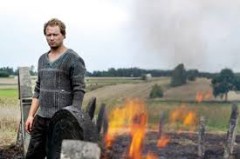Challenging conventional dogma in Poland, Wladyslaw Pasikowski’s intense and courageous feature film, Aftermath, boldly asserts that Polish Catholics, far from having been only victims of Nazi oppression, were also perpetrators.
Inspired by a notorious incident in 1941 in which as many as 1,600 Jews in the northeastern Polish town of Jedwabne were massacred by their Catholic neighbors in a gory spectacle of racial hatred, Aftermath has stirred anguished debate in contemporary Poland and even prompted some Polish theatres to ban it.

Written and directed by Pasikowski, the 107-minute movie will be screened by the Toronto Jewish Film Festival’s Chai Tea & A Movie series on Sunday, Nov. 24 at 5 p.m. at the City Playhouse Theatre (1000 New Westminister Drive, in Vaughan).
Co-presented by the Polish-Jewish Heritage Foundation of Canada, Aftermath is ostensibly about a reunion between two brothers who have not seen each other in 20 years. Franek Kalina (Irenusz Czop), the older brother, left Poland in the early 1980s and has lived in Chicago ever since. It`s not clear why he has chosen this particular moment to visit Poland, but Franek`s brother, Jozek (Maciej Stuhr), does not even bother showing up at the airport in Warsaw to greet him.
From almost the moment they meet at Jozek`s farm, there is tension in the air. Jozek holds a grudge against Franek because he did not attend their parents`funerals. And Jozek is still reeling from his wife`s decision to leave him and immigrate to the United States with their two young children. As they talk and argue, a rock crashes through Jozek`s window, leaving an atmosphere of uncertainty and fear. Puzzlement is added to the equation when the local police chief tells Franek that Jozek, a loner, has damaged a rural road and aroused the ire of his neighbors.
An element of mystery creeps into the narrative when the bank manager rejects Jozek`s loan application. It’s an odd rebuff, since Jozek`s farm is worth much more than the loan itself. Pressed to explain, the manager says that the deed to Jozek`s farm is murky.

Aftermath segues into the core of its theme, the uneven terrain of Polish-Jewish relations, when Jozek takes Franek to one of his fields and shows him a small forest of weathered tombstones, engraved with Hebrew lettering, he has planted.
During the German occupation, when Jews in the village were terrorized and persecuted, the gravestones were uprooted from a Jewish cemetery by the Nazis and used to reinforce a road near a tannery.
A flood in 1998 uncovered the tombstones, prompting people in the area to put them to various uses. As he relates the story, Jozek discloses he bought them from neighbors, cleaned them, learned Hebrew to decipher the inscriptions and set them upright in his field. “It seemed the right thing to do,” he says. “They were human beings.”
Franek, an antisemite who has already observed that “Yids” in Chicago have “cornered” the construction business, can’t understand why Jozek has spent valuable time and money on this “hobby.” As he puts it, “They are total strangers, not our people.” Franek proceeds to make another disparaging comment about the alleged sins of Jews in Chicago before asking, “Why should you care about their dead?”
“Because there is no one else,” replies Jozek, admitting his neighbors oppose his efforts and thinks he’s “nuts.”

Playing detective, Franek discovers that the land Jozek inherited from his father was, in fact, owned by Jews prior to the Holocaust. Jolted by the revelation, Franek consults with the parish priest he has known all his life. The priest sings Jozek’s praises, saying he is performing “god’s work.” He hastens to add that people don’t take kindly to his activities. Another priest warns Franek that his brother is stirring up trouble and defying the status quo.
Uncharacteristically, Franek helps Jozek collect still more Jewish tombstones. a development that touches off a tense confrontation with angry villagers.

In these pivotal scenes, Pasikowski raises an extremely sensitive issue. As the Polish-American historian Jan Gross has written, Poles who won possession of Jewish property during and after the war were none too pleased when their rightful Jewish owners returned to reclaim them. More often than not, these unpleasant encounters spawned still more antisemitism.
In dealing with the question of antisemitism, which has long plagued Poland, Pasikowski is fearless. He ventures not only into the past, which is definitely checkered, but also into the landscape of antisemitism in Poland today.
Having upset their neighbors, Franek and Jozek become the targets of a hate campaign during which Jozek’s property is defaced with anti-Jewish graffiti and then set alight. And in a final indignity, they’re both branded “Jews.”
Franek, having discovered that Jozek’s farm sits on Jewish land, becomes a truth seeker. He wants to know exactly what happened in the village during the Nazi occupation. The answer is provided by two old women, who recall in terrifying detail the wanton murder of its Jewish residents in 1941.
The stories they tell, and the secrets that emerge, shake up the brothers, shattering their faith and assumptions.
Pasikowski directs with a steady hand, and Czop, Stuhr and the rest of the cast turn in authentic performances in an increasingly dark and uncompromising film larded with biblical overtones of good and evil.
Aftermath is a must-see film that faces unpalatable truths unflinchingly.
for gets beaten up in a restaurant
